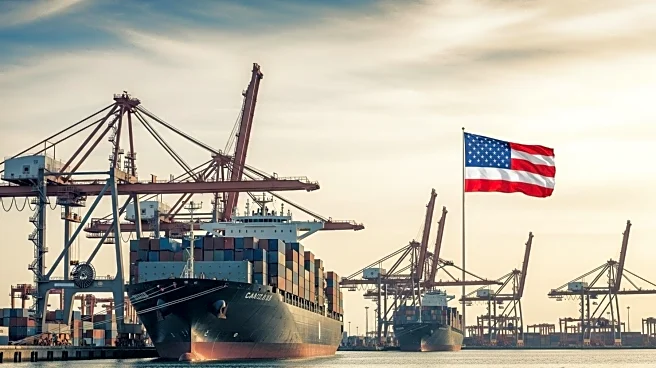What's Happening?
The U.S. government has revoked a sanctions exemption policy on Iran's Chabahar port, which is expected to impact the India-led development of the facility. This decision is part of the U.S.'s maximum pressure policy aimed at isolating the Iranian regime, with tighter sanctions on Iran's shipping sector. The exemption, introduced in 2018, was intended to facilitate Afghanistan's reconstruction and allowed Chabahar port to remain insulated from broader sanctions. Indian Ports Global Limited (IPGL) took over operations at Chabahar port under a 10-year contract with Iran's Port & Maritime Organization, committing $370 million to its development. The port, located on Iran's southeastern coast along the Gulf of Oman, is a strategic investment for India to boost regional trade with Central Asian countries, including Afghanistan. The revocation of the sanctions waiver is set to affect India's regional connectivity plans and may expose operators to sanctions under the Iran Freedom and Counter-Proliferation Act.
Why It's Important?
The revocation of the sanctions waiver on Chabahar port holds significant implications for regional trade and diplomatic relations. For India, the port is crucial for enhancing trade routes with Central Asia and Afghanistan, and its development has strengthened ties with Iran. The U.S. decision complicates India's diplomatic balancing act between maintaining relations with both the U.S. and Iran. The move also impacts India's investment in the port, which has seen substantial growth in container throughput under its management. The broader geopolitical ramifications include potential disruptions in regional trade dynamics and challenges in India's foreign policy strategy. The U.S.'s stance may also influence other countries' approaches to engaging with Iran amidst heightened sanctions.
What's Next?
India's trade minister, Piyush Goyal, is expected to visit Washington to negotiate tariff reductions, following the Trump administration's decision to double tariffs on Indian imports to 50%. These negotiations are crucial for India as it seeks to mitigate the impact of the U.S. sanctions on its strategic investments in Chabahar port. The ongoing modernization of the port is uncertain, and India may need to reassess its involvement in the project if the sanctions pose significant operational challenges. The diplomatic consultations between India and Iran earlier this month indicate a continued interest in advancing the Chabahar project and the International North-South Transport Corridor, despite the U.S.'s actions.
Beyond the Headlines
The U.S. revocation of the sanctions waiver on Chabahar port highlights the complex interplay of international diplomacy and economic interests. The decision underscores the challenges countries face in navigating U.S. foreign policy, particularly in regions with strategic investments. For India, the situation presents a diplomatic conundrum as it balances its relations with the U.S. and Iran. The long-term implications may include shifts in regional trade alliances and the need for India to explore alternative routes or partnerships to achieve its connectivity goals. The development also raises questions about the effectiveness of sanctions as a tool for achieving geopolitical objectives.










